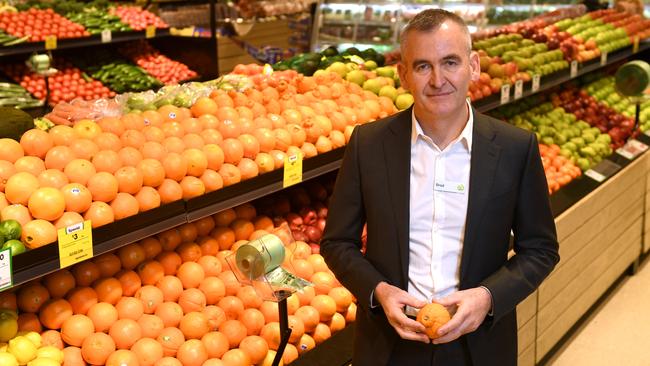Woolworths food sales slow as Australians head out following end of lockdowns
Woolworths CEO Brad Banducci believes Australia is moving to the ‘next phase’ of shopping trends triggered by the Covid-19 pandemic as people enjoy eating out again.

Woolworths CEO Brad Banducci believes Australia is moving to the “next phase” of shopping trends triggered by the Covid-19 pandemic as people enjoy eating out again at restaurants and cafes and puncture two years of heightened supermarket sales.
Mr Banducci said he was already witnessing many consumers in Sydney enjoying nights out and socialising, with Victoria to follow as it emerges from lockdown, leading to a slowing of Woolworths food sales.
However, with working from home still popular – driving sales of breakfast and lunch foods – and catering for family gatherings kicking off with Halloween and heading into Christmas, Mr Banducci was upbeat about Woolworths maintaining or possibly growing its market share over the remainder of 2021.
In a trading update ahead of the Woolworths annual meeting on Thursday, Mr Banducci sales for his flagship supermarket arm had tapered in recent weeks coinciding with the end of lockdowns in NSW.
First quarter Australian supermarket sales grew by 3.9 per cent to $12.27bn and like-for-like sales by 2.7 per cent.
“We are just entering the next phase of Covid in our mind and we need to continually adjust our setting for the next phase,” Mr Banducci said.
“Clearly as you come out of the lockdown period there is quite a large adjustment as people take advantage of new-found freedoms.
“There is still elevated home demand for food even post-lockdown partly driven by people working from home, and more natural demand in the home for things like breakfasts and lunches.
“There’s no question in our minds there will be a few more curve balls,” Mr Banducci said.
He described the first quarter of fiscal 2022 as the most challenging quarter of the pandemic as thousands of staff pushed into isolation because of Covid-19 exposure disrupted its operations.
The slowdown in sales growth since October came after record highs last year when the pandemic hit and shoppers stripped supermarket shelves to fill up their pantries.
Woolworths dropped more than 3 per cent and ended down $1.31 at $39.16.
The retailer also revealed that Big W was particularly hit hard by the forced closures of non-essential retail in the most recent lockdowns, with the strong trajectory in sales growth captured since last year reversing as sales fell 32.1 per cent, although online sales did rocket 123.8 per cent as shoppers pivoted to online. Total Big W sales fell 17.5 per cent for the first quarter to $920m.
Mr Banducci said Woolworths was maintaining its market share, and perhaps even gaining some, and the retailer was mindful of remaining competitive as it considered shielding its profit margins from inflation while not ratcheting the bill for its shoppers.
At Woolies X, its tech and digital arm, for the first quarter average weekly traffic to the Woolworths and Everyday websites and apps reached 15.6 million, up 36.8 per cent on the first quarter last year. E-commerce sales lifted 53.1 per cent to $1.389bn, equal to 11.4 per cent of Woolworths retail sales.
JP Morgan analyst Bryan Raymond described the first quarter as broadly in-line with the firm’s forecast and the slump at Big W better than expected.
Shaun Cousins at UBS said supermarkets like-for-like sales growth of 2.7 per cent was below UBS estimates of 4 per cent growth, with a greater slowdown in September than expected.
“The slowing in trading to start the second quarter was expected given tough comparables and ongoing reopening. Australian food (supermarkets) reflects emerging volume concerns while the expected food inflation has yet to eventuate. Big W performance is better than UBS estimates with Woolworths confident Christmas inventory will arrive despite a slower inflow.”
Later at the Woolworths AGM, chairman Gordon Cairns said the end of 2021 marked the successful completion of a key milestone, the demerger of its drinks and pubs business Endeavour Group.
“As a result of the demerger, Woolworths Group and Endeavour Group are now separately able to focus on their core customer offerings and new growth opportunities while continuing to benefit from a mutually-beneficial commercial partnership. Woolworths Group will become a more focused food and everyday needs business with further opportunities to build out our retail ecosystem.”
In his AGM address Mr Banducci said as restrictions began to ease in many parts of the country, vaccination continues to be key to workplace safety including a decision by Woolworths recently to make vaccinations mandatory for all staff.
“We need to provide the safest possible workplace for our team to work, as well as for our customers to shop, as we continue to provide an essential service for our communities.”







To join the conversation, please log in. Don't have an account? Register
Join the conversation, you are commenting as Logout